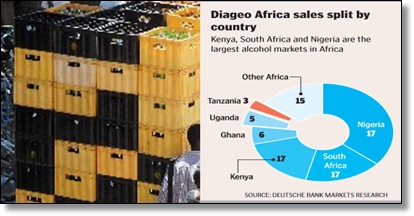Africa’s Middle Class Thirst for Alcohol: Call for Sound Public Policy

 |
| Graphics Courtesy |
Kenyans reportedly guzzled over 600 million liters of alcohol in 2011 worth an estimated USD 2.2 billion more than double the USD 950 million the country receives in Diaspora remittances. The Deustche Bank Market research lists Kenya third among top African beer consumers at 17%, Nigeria and South Africa at 18% and 36% respectively.
A survey by the investment company Renaissance Capital in 3 major Nigeria cities, Lagos, Abuja and Port Harcourt indicate that the majority of middle class Africans are young and in acquisitive life stage. Nearly 70% of the acquisitive middle class are aged below 40 years with main focus buying on home improvement goods, transportation and leisure. In Kenya, women are increasingly replacing men on the beer tables. According to East Africa Breweries Ltd, Kenyan women are feeling more confident; more independent and call for their own drinks unlike in the past where they had to rely on men. Africa boasts of an estimated 100 million self reliant women above drinking age. While all these data forecasts are growth positives to the brewers, they can potentially turn out to be a nightmare for policy makers if the right regulatory framework is not in place.
Sub-Saharan Africa’s drinking culture was initially associated with social events, such as marriages, childbirth, circumcision, funerals, coming of age and other important meetings. The rise in urbanization and income disparities has led to differentiation of alcoholic products targeting income, gender and class. Some school of thought hold that the rise of the acquisitive middle class can change the drinking culture of this group from use as a basic need to surplus use of alcohol. But that remains to be seen as the rising middle class have an awareness and understanding of the harms of excess and abuse of alcohol and other health matters that the generation above them did not possess. Consumption of alcoholic beverages may be driven by multiple distribution centers, marketing strategies that are gender specific and generally associated with entertainment and social membership among peers.
Albeit, reasons for consumption of alcohol have evolved from the original focus on social events to some taking it as a refuge from economic hardships or desire to identify with a given social group or status. Countries in Africa, like in most markets around the world are faced with a threat of excessive use, abuse and suspect regulatory and enforcement frameworks. The rise in middle class population presents the continent with a unique opportunity to scale up production of hygienic and standardized brews. It also presents a fairly literate critical mass with who to share evidence based need for judicious consumption of alcoholic beverages.
It is a common feature in Sub-Saharan Africa to have excellent regulations on paper but little or ineffective enforcement. Kenya drains the energies of its security forces battling illicit brews on a daily basis. Arguments to the effect that Africans are prone to binge drinking ought to push policy makers and enforcers back on the drawing table. Health may be a private affair but when it impacts on non-active consumers and puts pressure on a nation’s budget, it has to be addressed as a national issue.
As Africa celebrates increased investments from businesses including alcohol production related industries; it is vital that they put in place sound and enforceable policies. The Alcohol industry players must too take a lead role in self-regulatory efforts by creating awareness, protecting citizenry and encouraging responsible and safe enjoyment of its products. After all, if all customers binge drink; get sick; fail to be effective at work or at worse die; a sick market cannot enjoy the next glass of a fine brew.
By James Shikwati,
The author [email protected] is Director of Inter Region Economic Network (IREN)
